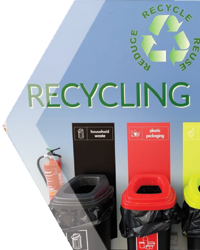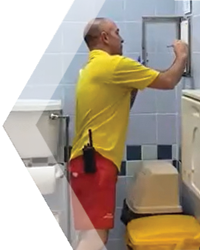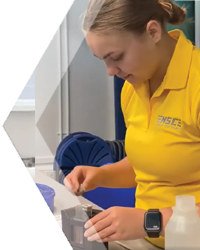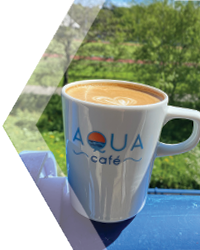Manx Sport and Recreation (MSR) are committed to supporting the environment through various initiatives that reduce our carbon footprint. Read more about the 9 measures we take below.
1. Energy Management
Key Policy Statement: Manx Sport and Recreation (MSR) shall aim to reduce the consumption of non-renewable energy, water and other natural materials to a minimum.
MSR aims to investigate and consider any new methods of energy or natural resource reduction. The following actions have been implemented:
- The waste heat reclaimed from the Power Station has resulted in large energy savings being made and a significant reduction in CO2 emissions.
- Thermal insulating jackets are fitted to heating systems.
- Installation of automatic closures to doors, including the front automatic sliding doors.
- The purchase of IT equipment with low energy monitors. It is also government policy to shut down all computers each evening in order to save energy.
- Optimising all time controls and temperature controls to ensure they are operating at their most efficient.
- Heat recovery by means of plate heat exchangers on air handling units.
- The installation of timed flow valves to showers and washbasins.
- Where possible standard light units are replaced by low energy LED fittings.
- A planned maintenance schedule is carried out to ensure all plant and equipment is operated at its most efficient. This includes boiler efficiency, which helps reduce toxic or undesirable environmental emissions
2. Recycling
The NSC is proactive about re-cycling and the following materials are recycled:
- Paper
- Cardboard
- Cans
- Plastic Bottles
- Tetra Pack
- Printer Cartridges
- Florescent Light Bulbs
Please use the designated re-cycle collection bins in the atrium area.
3. Energy Saving
The NSC uses technology to save energy and this includes:
- The Building Management System (BMS) automatically controls the NSC’s heating and ventilation system at set parameters.
- Pumps and motors automatically switch to reduced output during the night to save energy.
- Heat Exchangers are used to transfer heat to enable heat to be used again.
- The moveable pool floor is lifted each night and this acts as a thermal blanket to reduce heat loss from the pool.
- Most of the NSC building is fitted with LED lights and these lights are much more energy efficient.
4. Cleanliness Standards
The NSC aims to provide a clean facility for customers to enjoy.
- The NSC has a cleaning contract in place in addition to NSC staff undertaking daily cleaning duties.
- Provide detailed cleaning schedules for staff to follow.
- Provide appropriate cleaning materials for staff to keep the facility clean.
- Undertake regular checks of cleanliness standards.
- Provide anti-bacterial spray and paper towels in the gym for customers to wipe the machines down after use.
If any customer is not satisfied with the standard of cleanliness in any of the NSC’s facilities please report the area to a member of staff
5. Environmental Conditions
- The NSC will carry out Control of Substances Hazardous to Health (COSHH) Assessments on pool and cleaning chemicals.
- Provide staff with training in the safe use of chemicals.
- Chemical data sheets will be held on site for chemicals used.
- Wherever possible aim to reduce or eliminate hazardous substances.
- Maintain robust pool testing records to monitor Chlorine and PH levels.
- Undertake monthly bacteriological pool testing samples for Government Laboratory analysis.
- Undertake Risk Assessments for activities provided.
- Provide a clean facility for customers to enjoy
6. Pool Water Management
- The NSC uses Ultra Violet (UV) in addition to chlorine to treat the pool water. UV technology is recognised as best practice in the treatment of pool water. The use of UV also means that less chlorine is needed in the pool water which is better for the environment.

- The NSC staff undertake regular testing of the pool water throughout the day to ensure it is within swimming pool industry parameters.
- The NSC undertakes monthly pool water bacteriological water samples that are taken to the Government Laboratory for analysis.
- The pool water is constantly being circulated and treated to keep it in good condition.
- Frequent dilution of the pool water is undertaken with a fresh incoming supply, this helps to keep the pool water in good condition for swimming.
- The treatment of the pool water is fully automatic via a dosing system in the plant room.
- Many of the NSC’s staff have received Pool Plant Operators training.
7. Waste Heat
You may not be aware but the NSC is connected to the Power Station via an underground waste heat pipe. Some of the Power Station’s waste heat is used to provide heating to the NSC building.
This is saving a considerable amount of energy that would otherwise be wasted.
8. Active Travel
- The NSC forms part of the Heritage Trail which encourages Active Travel via walking and cycling along the old railway line route.
- The NSC’s Raceway facility that surrounds the Athletics Track is free to use by cyclists, runners and walkers. It is an excellent facility which is lit up at night for the public to use safely and is traffic free.
Benefits of active travel
- Better places for people: By improving the walking and cycling environment.
- Reducing carbon emissions and improving air quality: By providing cycling and walking opportunities.
- Reducing congestion: By providing a safe route through the NSC as part of the Heritage Trail.
- Increasing opportunities to socialise: By providing cycling, running and walking opportunities at the NSC.
- Saving money: The running cost for cycling and walking are significantly lower than that of a car or motorcycle.
- Health: Increasing the amount of light exercise you do each week. There is strong evidence that regular physical activity reduces the risk of a range of health conditions. The best way to increase physical activity is by making it easy for people to be active within their daily routine, this can include part journeys, for example by parking out of town and walking into work.
Don’t just travel: Make it Active Travel
9. Aqua Café
The Aqua Café, located at the NSC has reduced its carbon footprint by:
No Longer providing
- Plastic stirrers.
- Plastic cups.
- Plastic plates.
- Polystyrene containers.
- Plastic milk cartons.
The Aqua Café provides the following:
- Biodegradable take away cups.
- Biodegradable take away containers.
- Tetra Pack milk cartons which are recycled.
- Specific food products are delivered in paper bags as opposed to plastic bags.
- The Café recycles plastic bottles, glass bottles and cardboard.
The Café’s food and drinks are purchased locally from local suppliers and producers.
